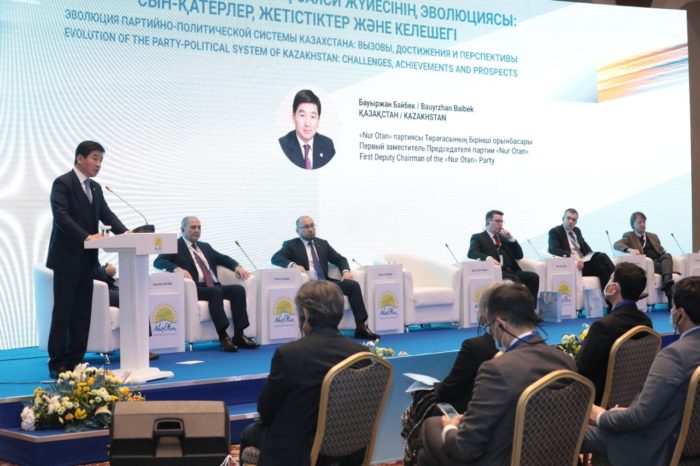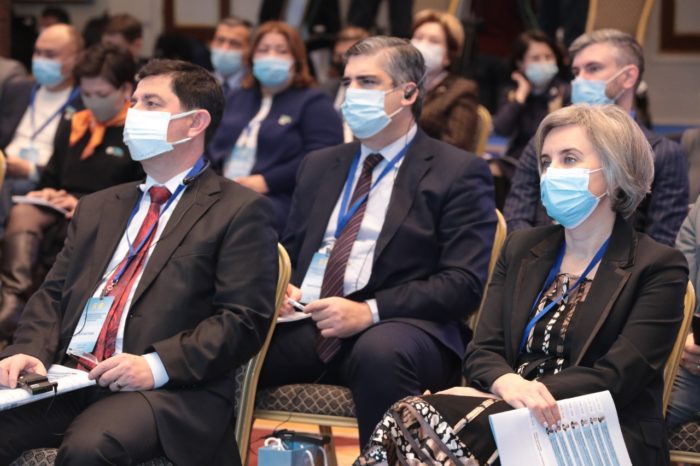NUR-SULTAN – Political and economic stability, fair representation of women and young members, and ability to adapt to changes were highlighted as the main achievements of the political system by experts at the international forum, which was held in Nur-Sultan on Nov. 29-30.

Bauyrzhan Baibek, the First Deputy Chairman of Nur Otan party delivers remarks at the forum “The Evolution of Party-Political System of Kazakhstan”. Photo credit: Institute of Public Policy of Nur Otan party.
The conference titled “The Evolution of Party-Political System of Kazakhstan: Challenges, Achievements and Perspectives” was organized by the Institute of Public Policy of Nur Otan Party. Speakers from 15 countries shared their vision of the success of the political party system in Kazakhstan and its ruling party Nur Otan.
Bauyrzhan Baibek, the First Deputy Chairman of Nur Otan party, started the forum by naming seven main achievements of the political party system during 30 years of independence of Kazakhstan. Those achievements are provision of peace and accord; abandoning the nuclear arsenal and closure of Semipalatinsk polygon; building the new capital – Nur-Sultan; good intra-regional relationships that allowed for safety of state borders, crucial reforms on transformation to market economy that allowed 70 percent of total investment to Central Asia to flow to Kazakhstan; large scale investments into transport infrastructure – the largest being West Europe – West China highway project; and population increase to 19 million people (9.5 million of them were born in independent Kazakhstan).

Photo credit: Institute of Public Policy of Nur Otan party.
According to Baibek, all this became possible due to capable socio-political institutions, advanced human capital, improvement of the life of Kazakh people, as well as the multi-party system built over the years of independence with theNur Otan party.
Important changes in the political party system were introduced during President Kassym-Jomart Tokayev’s presidency. “The country has already implemented several political reform packages. For parties, the registration barrier and the barrier for passing to Majilis (lower house of Parliament) have been legally lowered, quotas have been established for youth and women in electoral lists, the institution of parliamentary opposition has been consolidated, a notification principle for holding assemblies has been introduced, as well as the institution of direct election of rural akims,” said Baibek.
“Today three political parties are represented in the Majilis, five political parties are represented in local representative bodies – Maslikhats, and six political parties of Kazakhstan are represented at the level of rural akims. Thus, it can be stated with confidence that the multi-party system built over the years with the Nur Otan party is an important achievement of independence,” he added.
Some experts noted the importance of introducing quotas for women and young members in Parliament.
Tom Van Dijck, the Secretary of the Group of European Conservatives and the Democratic Alliance in the Parliamentary Assembly of the Council of Europe, said that a 30 percent quota for representation of women and young people in political parties placed Kazakhstan ahead of many European states.
Another achievement of Nur Otan party, according to Dijck, is direct communication with the population through online resources. “In 2020 Nur Otan party’s branches have considered 400,000 requests from people and more than 90 percent of the issues were resolved. This means that thousands of people have confidence in the party,” said Dijck.
Richard Murphy, the member of the Board of Directors of the International Association of Political Consultants expressed his admiration towards young members of the party that he met. “Communicative, dynamic, mobile, constantly improving, and tolerant” young members will be the driver in the political sphere of the country,” he said.
Political parties face challenges in economics, healthcare, public security, and adaptation to new challenges in the world.
The rise of populist views such as feminism, pacifism, environmentalism, anti-globalism, etc. parties should reflect the interests of a variety of people, said Dauren Abayev, the First Deputy Chief of Staff of the Presidential Administration of Kazakhstan.
“Of course, in carrying out a balanced political modernization, we take into account the growing global challenges and trends and act on the demands of Kazakh society. Political parties also need to rebuild themselves in a timely manner. This opens new opportunities for strengthening the positions of political parties,” said Abayev.
On the second day of the forum, the speakers talked about the prospects of development of parties. Lord James Wharton, Member of the House of Lords of British Conservative Party shared the experience of Conservative party in dealing with modern political challenges. He said that in order to succeed, parties should change the way they receive and deliver their message. More local, more tangible, and more personal messages from politicians will have a greater impact on the public, and social media is an important tool that parties should not neglect, said Wharton.
Dijck highlighted the importance of increasing visibility through tourism, sports events and branding of the party based on cultural and ideological values. According to him, those factors will help parties position in a positive spectrum in the long run.

